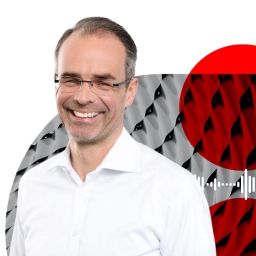Although it is often difficult to see them, and painful to recognize them, mistakes are a part of all of our lives. For companies, mistakes can have very serious consequences, especially when they are made by senior executives. Some mistakes can be prevented, but avoiding them all is simply impossible.
What sets apart the most influential leaders is that, throughout their careers, they have learned to peacefully coexist with their mistakes, and they have been able to learn a lesson from each failure. They do not try to present themselves as infallible, because they know that real leadership is human. This means accepting that, sometimes, you need to fall, so that you can get back up and continue to grow. Sharing this vision is one of the best ways they can inspire their teams, and be an example for their companies, and society at large. Because, in the majority of cases, although it is our successes that shine, these can only be achieved once we have gone through countless rough patches.
The sessions “El éxito oculta lo que el error enseña”, organized by IESE, together with the association Connecting Talks, which were held on the Barcelona and Madrid school campuses, brought together renowned executives, sportspeople and speakers who shared some of the setbacks that have helped them to develop as people and move forward in their careers.
Based on these chats, we have selected some of the most common mistakes made by executives, and the lessons we can learn from them.
8 common leadership mistakes
1. Choosing the wrong team members
For Lucas Carné (MBA-99), founder of Privalia, one of the main setbacks at the start of his career was getting involved with people who, in reality, did not share his values, goals, or degree of involvement. “Sometimes, I didn’t have enough information, or the conditions which had been agreed were not clear enough for everyone to successfully do their part”, he explains. In other words, some of his colleagues changed their minds as they went along.
He learned that, when creating a team, you need to try to get to know the people you are partnering with, as far as possible. You cannot assume anything that has not been discussed beforehand, and “you always need to be prepared for someone to behave in a way that you didn’t expect”.
As for Francisco Reynés (MBA-89), Chief Executive of Naturgy, he recognizes that some of the worst mistakes you tend to make as an executive have to do with “trusting people you shouldn’t, and not trusting those that you should, underestimating the human element, and believing that you can control everything”.
2. Giving up after a disappointment
Ona Carbonell, one of the world’s top synchronized swimmers, and Christine Giampaoli, a rally driver, know what it’s like to be told “no”, and to collapse after years of hard work.
Carbonell wasn’t selected for the Olympic Games, after having largely put her personal life on hold for almost four years, and having spent more time in the water than out of it. She remembers spending “the whole summer crying, non-stop, watching the games on television” and asking herself whether or not she should continue. Giampaoli seriously injured her leg and was isolated from her team, at a time when they were beating the records set by Carlos Sainz.
Although these disappointments almost led Carbonell and Giampaoli to give up, they were both able to move forward, committed to what they believed in and convinced that it was worth trying one more time. In some cases, the most appropriate decision is to give up. In their case, continuing allowed them to compete again, and to make history in their sports.
3. Thinking everything depends on you
Laureano Molins, one of the most famous thoracic surgeons in Spain, has first-hand knowledge of adversity. In spite of his experience, and an extensive career in which he successfully operated on hundreds of patients with cardiac issues, he was not able to bring his brother back when his turn came.
For Molins, this difficult blow became an even more painful journey, because, in the beginning, he tormented himself, thinking he “could have done much more” to save his brother, and that his life had been dependent on him alone.
He was able to heal this deep wound once he learned to change his mentality, and he started to recognize that something as complicated as a heart condition depends on a multitude of factors which are both critical and uncontrollable, and not just on the ability of one surgeon.
Many executives falsely believe that they should always carry the entire company on their shoulders, but this often leads to a lot of stress, frustration and helplessness. Although it was not enough in that moment, Molins ended up understanding that he had done all he could, and given all he had. Thanks to this, he was able to continue practicing and saving the lives of many other patients.
4. Bragging about your mistakes
Alejandro Hernández-Puértolas, the CEO of HIP, Blackstone’s hotel platform, looking back on his career, recalls that “you almost never rise as high as you want, but you also never fall as far as you fear you might”. However, “losing your respect for failure and trivializing it may have consequences that will stay with you for the rest of your life,” he adds.
Beyond the danger implicit in underestimating the consequences that failure can have for our companies, teams, families or careers, Hernández-Puértolas warns that, “in reality, in the business world, nobody takes people who say they learned a lot by losing a million euros seriously”. Recognizing your mistakes and learning from them isn’t the same thing as flaunting your failures or setbacks. This sort of bragging may have a profound effect on your credibility in the organization.
5. Beating yourself up when you get it wrong
In the same way, learning a lesson from each setback shouldn’t mean that we torture ourselves. For Francisco Reynés, not knowing why you have failed “is as bad as not knowing why you got it right”, and any result that we see should give us useful information that will help us to know what works, what doesn’t, and how to keep improving. For this reason, at Naturgy, they have introduced self-analysis as another process within the company. However, “it’s one thing to recognize and analyze a failure, and it’s another thing entirely to condemn yourself for having made a mistake; this will just paralyze you,” he explains. Reynés maintains that he doesn’t remember how many times he has failed, “because there are so many”. But he has always preferred to remain “proud of having tried”, as “doing nothing is always much worse than getting it wrong,” he believes.
In this sense, Enrique Cerezo, president of Atlético Madrid and film producer, adds that “when you fully commit to something, and you believe what you are doing will be successful, you can stay true to your dream even when you fail”.
6. Overvaluing your company
Fuencisla Clemares (MBA-00), the CEO of Google in Spain and Portugal, recognizes that, when you work at such a prestigious company, it is easy to end up thinking that “nobody in the market can offer anything better than you”. This meant that, for a long time, at Google, visits to customers were based on “simple product presentations”, without any space for listening or seeking the best way to adapt to meet their needs.
But it didn’t take long for Clemares to realize that, in order to not lose their privileged position, they needed to change course, and put the customer at the heart of their work. This led to “a cultural and organizational transformation that was successful, but much slower and more complex that we could imagine today,” she maintains.
Currently, at Google, mistakes are dealt with naturally, and go through a process that allows useful conclusions to be drawn for the future. “Every time we experience failure, we explain how we are going to try to improve from then on, and how we expect this change to benefit us,” she notes.
7. Making decisions without being able to justify them
Jordi Llach, CEO of Nestlé Iberia, recalls how opening a Nescafé Dolce Gusto store in Lisbon almost became one of the biggest mistakes of his career. He launched the establishment behind his superiors’ backs, because the strategy of the multinational clearly ruled out the creation of brand stores. The Lisbon store ended up failing economically and, when his bosses found out about everything, they wanted an explanation.
The executive responded by presenting his reasons in a detailed manner, as well as the goals that were behind the failed endeavor. And although, evidently, it didn’t work, his superiors understood why he had tried it, and continued to have confidence in him.
Llach continued to grow at Nestlé and now, whenever he participates in a seminar or conference, he asks the audience if they think it is possible to move forward in a company or a business without breaking a single rule. He does warn that, “although you cannot be an executive without breaking some eggs, you need to do so very carefully, and with a good explanation, because, at the end of the day, those eggs are yours as well”.
8. Pursuing an inherited idea of success
What is success for you? According to the consultant and speaker Borja Vilaseca, a classic mistake made by executives is adopting a definition of success and failure that is learned from their environment, which they inherited without really questioning whether or not it aligns with their values. This behavior condemns many leaders to pursue a life and a professional career that, in reality, does not belong to them, but to the people they are emulating, often subconsciously.
To successfully exit this labyrinth, Vilaseca recommends, on the one hand, setting aside some time to get to know ourselves, and being honest with ourselves about “what we aspire to, what value we want to bring to society, what we understand success to be, or what we are prepared to do to achieve our goals”. Not according to the traditional vision of a victorious, authoritarian leader, but according to what we feel.
Once these fundamentals have been established, the second step consists of trying to apply these criteria; in other words, “living according to the values that are truly important to us,” she explains. Only in this way, she states, “will we be able to judge whether we are satisfied or disappointed with the results we are cultivating”.
Being a true leader means making complex decisions every day. And this will inevitably mean that we get it wrong more often than we would like. In the IESE executive programs, you will perfect your leadership skills to enable you to make the right decisions more often, and you will broaden your vision of the company to better understand what you can learn from each mistake that comes your way.

















